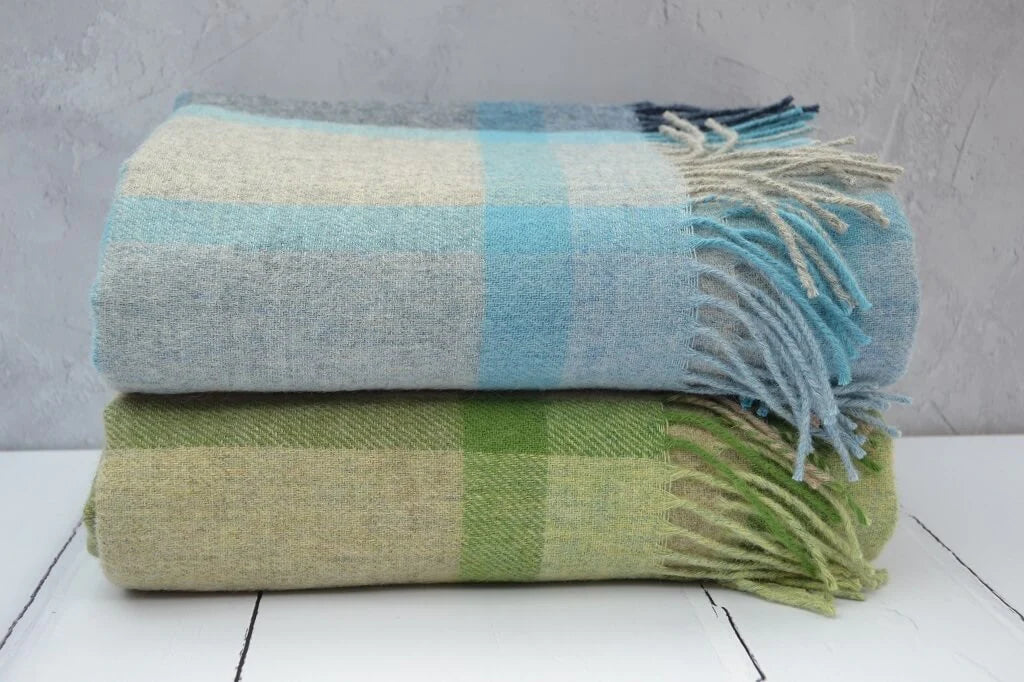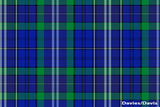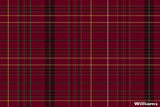Wishing you a Merry Christmas and a Happy New Year
Any orders will be shipped on 2nd January
Wishing you a Merry Christmas and a Happy New Year
Any orders will be shipped on 2nd January
Welsh Blankets
Candles & Soaps
Christmas Gift Ideas
Hand Dyed Yarn
Welsh Tartan
Welsh Tartans by Surname
Instinctively all Welsh people know that there are lots of Jones, Davies and Williams in Wales. Did you also know that many Welsh surnames have their own Welsh tartan? In the table below, discover the proof! The ten most popular Welsh surnames account for over 60% of all Welsh people and the top five, 46%. The top five are.
- Jones - 15%
- Davies - 10%
- Williams - 9%
- Evans - 6%
- Thomas - 6%
See the Jones Welsh tartan below - all the most numerous Welsh surnames have a Welsh tartan of their own.
Welsh Tartans by Surname in Table Form
Embrace your Heritage with a Welsh Tartan Scarf or Keyring. Many Welsh surnames have a Welsh tartan. Our Welsh tartan scarves are made with luxury, pure new worsted wool or lambswool. These unisex scarves are approximately 150 x 28 centimetres (58 x 11 inches) in length and is 350 grams (13 ounces) in weight. Finished with a fringe., it includes the sewn in label of the tartan name.
Many of the most numerous Welsh surnames available - the most popular five are Jones, Davies, Williams, Evans and Thomas, but there are many more! There's also a range of Welsh national tartans such as Owain Glyndŵr, St David's and Pride of Wales.
Most Popular Welsh Surnames
| Ranking | Surname | Most Popular Welsh Surnames |
| 1 | Jones | 14.5% |
| 2 | Davies | 9.5% |
| 3 | Williams | 9.4% |
| 4 | Evans | 6.3% |
| 5 | Thomas | 6.1% |
| 6 | Roberts | 3.9% |
| 7 | Lewis | 3.4% |
| 8 | Hughes | 3.2% |
| 9 | Morgan | 2.9% |
| 10 | Griffiths | 2.5% |
| Top Ten Welsh Surnames | 61.7% | |
| 11 | Edwards | 2.4% |
| 12 | Smith | 2.2% |
| 13 | James | 2.1% |
| 14 | Rees | 2.1% |
| 15 | Owen | 1.8% |
| 16 | Jenkins | 1.7% |
| 17 | Price | 1.7% |
| 18 | Morris | 1.7% |
| 19 | Phillips | 1.6% |
| 20 | Richards | 1.4% |
| 21 | Lloyd | 1.3% |
| 22 | Harris | 1.1% |
| 22 | Taylor | 1.1% |
| 24 | Parry | 1.1% |
| 25 | Powell | 1.0% |
| 26 | Brown | 1.0% |
| 27 | John | 0.9% |
| 28 | Watkins | 0.8% |
| 29 | Howells | 0.7% |
| 30 | Pritchard | 0.7% |
| 31 | Rogers | 0.6% |
| 32 | Hill | 0.6% |
| 33 | Hopkins | 0.5% |
| 34 | Ellis | 0.5% |
| 35 | Bowen | 0.5% |
| 35 | Johnson | 0.5% |
| 37 | Matthews | 0.5% |
| 38 | White | 0.5% |
| 39 | Wilson | 0.5% |
| 40 | Rowlands | 0.5% |
| 41 | Martin | 0.5% |
| 42 | Baker | 0.5% |
| 43 | Clarke | 0.5% |
| 44 | Bennett | 0.5% |
| 45 | Pugh | 0.5% |
| 46 | Green | 0.5% |
| 47 | Turner | 0.4% |
| 48 | Walters | 0.4% |
| 49 | Collins | 0.4% |
| 50 | Bevan | 0.4% |
What is the Patronymic Naming System
The ancient Welsh patronymic naming system describes the process of giving a child the father's forename, as a surname. This means that a family's name (surname) changes in successive generations. The Welsh patronymic system describes family trees in terms of the male line only and records the family association in the 'ap' or 'ab' prefix ('ap' is a contraction of the Welsh word 'mab', which means son). For example, Rhys ap Dafydd translates as 'Rhys, son of David'. Modern Welsh surnames such as Powell, Price and Prichard are the result of this contraction and a progressive tendency to Anglicise Welsh names: under the patronymic system they would have been ap Hywel, ap Rhys and ap Richard.
Conversion of Welsh Surnames to Fixed Name Surnames
This process of conversion to the system of fixed names in Wales began in the fifteenth century and continued through to the middle of the eighteenth century. The trend was stratified socially: the higher classes in society began the process, which then was passed on to the lower classes.
The range of Welsh surnames is small, due in part to this process of conversion, but also because of the growing tendency to adopt English forenames (usually taken from Christian saints), particularly in towns on the Welsh borders. Names such as John, William, David and Hugh became Jones, Williams, Davis and Hughes. In north Wales, place names were frequently adopted, and in mid Wales families adopted nicknames for surnames. Jenkins is possibly derived from two different sources: as a corruption of a Flemish version of John, and as a result of the popularity of the name Ieuan in Wales during this period. Ieuan also gave rise to Evan(s) and Jones.
Recording of Welsh Surnames - Act of Union 1536
The way in which official records of births, marriages and deaths were kept also complicates the issue. The Act of Union (1536) stated that all official documentation in Wales was to be carried out in the English language. This meant that Welsh names were registered in an anglicised form. The process of civil registration in 1837 completed the long transition to fixed surnames. The traffic was not all one-way, though. The names of Welshmen who migrated to England were often transposed into English, so Ddu became Dee and Caradog became Craddock.
About FelinFach
Located in Pembrokeshire Wales, our ethos is defined in the three words...
NATURAL TRADITIONAL HANDMADE.
- Hand woven iconic Welsh blankets and Welsh tapestry blankets.
- Hand dyed yarn, dyed with natural dyes only - no exceptions!
- Handmade candles, candle accessories, Candle Making Workshops and soapery.
- Natural Dyeing Craft courses.
- Yarn shop, yarn bowls, project bags, tools and accessories for knitters and crafters.
- Welsh Gifts, souvenirs, made in Wales, handmade in Wales.
We are a proud supporter of Americymru, the Campaign for Wool, Global Welsh and Red Dragon America.
Last updated 29th November 2023





















